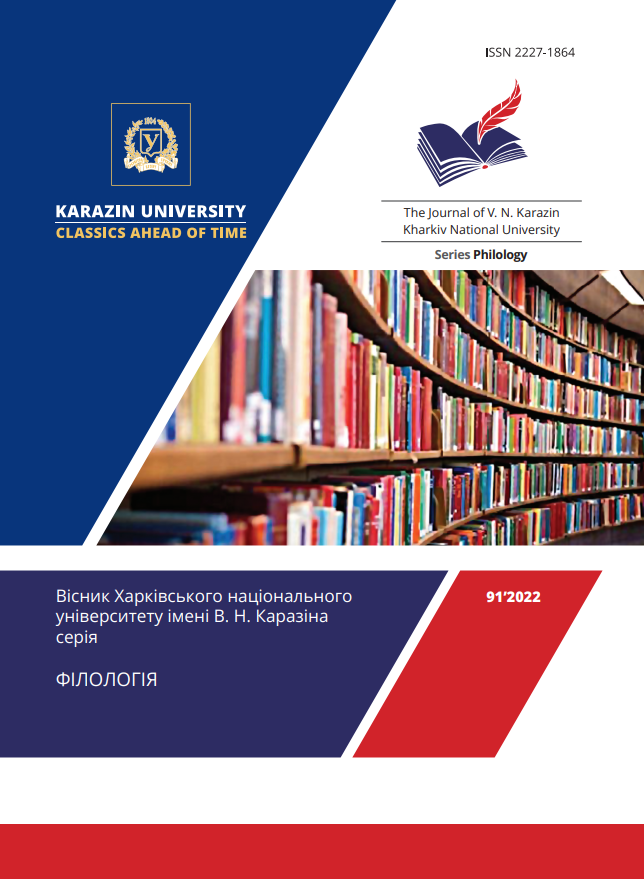Word-forming semantics of nouns in denumerative word formation
Abstract
The relevance of the study is determined by the need to take into account the principle aspect in the analysis of the the word-forming system of the modern Ukrainian language. Scientific works testify that the derivatives motivated by noun-, adjective-, and verb-forming bases, which represent the core parts of the language, are considered for the most part.
The purpose of the article is to establish the word-forming semantics of denumeratives – derived nouns grouped according to the nesting principle with vertex numerals belonging to the periphery of the forming base, find out the types of derivation and models of creation.
The analysis was carried out using the structural-semantic method in combination with the use of lexical-semantic transformations.
The onomasiological aspect involves the interaction of a simple motivational base, which is represented by adjectives, nouns, numerals, and verbs, and word-forming means; hence, thirteen word-forming meanings have been established, the carriers of which are simple substantives. The word-forming semantics of compound two- and three-base nouns, motivated by word combinations with subordinating and singly consecutive types of connection, have been determined; the number of word-forming meanings of complex formations is six. The nature of the correlation of the semantics of the formed word with the word-forming means was analyzed, particularly in syntagmatic word-forming meanings complicated by subcategorization and recategorization content, thus the types of derivation of word-forming meanings were established – mutational, modificational, and transpositional. Within each of the nineteen semantic positions of derivative substantives, one hundred and twenty-nine word-forming models were identified, presented in a descending order of their performance.
The interpretation of the noun as a part of speech block in denumerative word formation contributes to the identification of the derivational capacity of the numerals of the modern Ukrainian language, complements the achievements of the principle derivation.
Downloads
References
Vasilevich, A. Ia. (1985). Word-forming nests of word roots with the meaning of thought in the modern Ukrainian language. (Autoref. diss. ... cand. phyll. Sciences). National Pedagogical Dragomanov University. Kiev [in Russian].
Hirniak, S. P. (1999). Structural and semantic organization of word-forming nests with basic verbs of speech in the Ukrainian language of the 19th–20th centuries. (Autoref. diss. ... cand. phyll. Sciences). Vasyl' Stus Donetsk National University. Donetsk. URL: http://library.nuft.edu.ua/ebook/file/10.02.01girnyak.pdf [in Ukrainian].
Holianych, M. I. (1979). Word-forming fields of roots with the meaning of speech in the modern Ukrainian language. (Diss. ... cand. phyll. Sciences). National Pedagogical Dragomanov University. Kyiv [in Ukrainian].
Hrymashevych, H. І. (2013). Numeral adverbials in Ukrainian dialects. URL: http://eprints.zu.edu.ua/15099/1/Гримашевич4.pdf [in Ukrainian].
Greshchuk, V. V. (1995). Ukrainian adjectival word-formation. Ivano-Frankivsk : Play [in Ukrainian].
Dzendziura, N. I. (2010). Word-forming nests of parametric adjectives. (Autoref. diss. ... cand. phyll. Sciences). Ivan Franko National University of Lviv. Lviv. URL: http://irbis-nbuv.gov.ua/cgi-bin/irbis_nbuv/cgiirbis_64.exe?C21COM=2&I21DBN=ARD&P21DBN=ARD&Z21ID=&Image_file_name=DOC/2010/10DNIGPP.zip&IMAGE_FILE_DOWNLOAD=1 [in Ukrainian].
Dyiak, O. V. (2006). Structural-semantic organization of word-forming nests with roots for the designation of metals. (Autoref. diss. ... cand. phyll. Sciences). Оles Honchar Dnipro National University. Kyiv [in Ukrainian].
Dumchak, I. M. (1988). Univerbation in the Ukrainian language. (Autoref. diss. ... cand. phyll. Sciences). Vasyl Stefanyk Precarpathian National University. Ivano-Frankivsk [in Ukrainian].
Lesiuk, N. P. (1982). Word-forming nests of roots with the meaning of movement in the modern Ukrainian language. (Diss. ... cand. phyll. Sciences). National Pedagogical Dragomanov University. Kiev [in Russian].
Lopatin, V. V. (1977). Russian word-forming morphemic. Problems and principles of description. Moskva : «Science» [in Russian].
Greshchuk, V. V. (Ed.). (2007). Essays on foundation-centered derivativeology. Ivano-Frankivsk : Sity NV [in Ukrainian].
Shvedova, N. Iu. (Ed.). (1980). Russian grammar. Phonetics. Phonology. Stress. Intonation. Word-formation. Language morphology. Moskva : Science, 1, 123–453.
Stepanenko, O. K. (2010). Semantics and structure of word-forming nests with a vertex somatic component. (Autoref. diss. ... cand. phyll. Sciences). Dnipropetrovskyi natsionalnyi universytet im. O. Honchara. Dnipropetrovsk.
Tikhonov, A. N. (1971). Problems of compiling a nested word-formation dictionary of the modern Russian language. Samarkand: Samarkand publishing house, A. Navoi University [in Russian].
Tyshchenko, O. O. (2016). Elliptical substantives in Modern Greek. Linguistic studies, 32, 33–36 [in Ukrainian].
Kharkivska, O. V. (2013). Numerical derivatives in the Ukrainian dialects of Transcarpathia, 95–98. URL: https://dspace.uzhnu.edu.ua/jspui/bitstream/lib/22156/1/Олеся%ХАРЬКІВСЬКА.pdf [in Ukrainian].
Dokulil M. (1962). Tvořeni slov v češtiné: Teorie odvozováni slov. Рraha. [in Czech].




